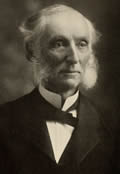Divine Library is a free online public library that includes free eBook downloads and free audio books.
We work with New Thought Seekers and Sharers around the world
insuring that all New Thought Texts in the Public Domain
are available for you to read on the web for free, forever!
Navigate through this book by clicking Next Page or Previous
Page below the text of the page & jump directly to chapters using the chapter numbers above the text.
sunk foundations on which the visible structure rests, but are not in the least disclosed in their nature by it. They are the submarine cable, neither declared in its length nor its depth, nor in the mechanical nor electric conditions of its structure, by the messages sent and received at either terminus. To introduce causes into consciousness, that they may be there directly known, is either to assert their supersensual and immaterial character, is to grant the assertion of idealism, "We do know the object, and therefore it is of a nature akin to thought," or it is to break down the fundamental distinction between mental and physical phenomena, affirming that both transpire in consciousness, and that the physical facts of the brain are the spiritual facts of mind. Yet having made this inadmissible concession, we are confronted with the fact, that consciousness does not of itself indicate whether the brain, or the heart, or the bowels, are the seat of thought; whether we see with our fingers or our eyes; and the further fact, that causes, as causes, are never discoverable even in purely physical effects.
The assertion, then, that we cannot directly know things in themselves, follows inevitably from the two assertions: consciousness is the sole field of perceptive knowledge; no material phenomena, as material, can appear in consciousness, interpenetrated, so to speak, by it. Consciousness covers all intellectual knowledge, and excludes all else; lays down a line of demarcation impassable either from within or from without, cutting apart matter and mind. This conclusion we believe all experience confirms, and that no one would have thought of denying it, save under the pressure of certain difficulties to be evaded, and certain conclusions to be reached.
Lesson 22 - 4. Perception and common conviction - p.91
4. How far pure idealism, that professedly knows only mind, is entitled to these assertions which we are
















